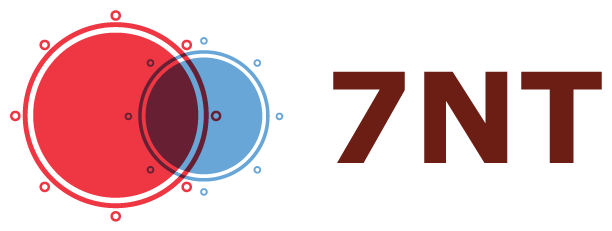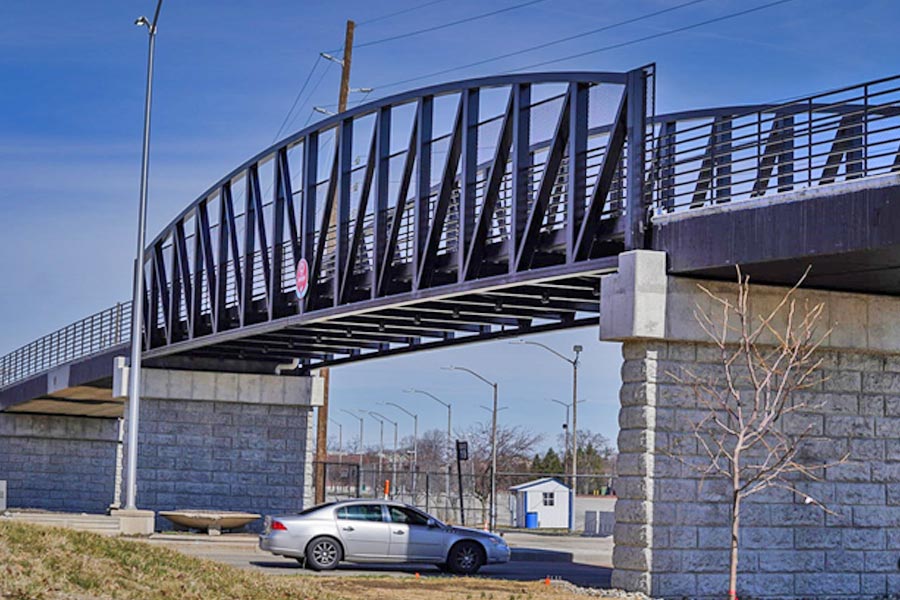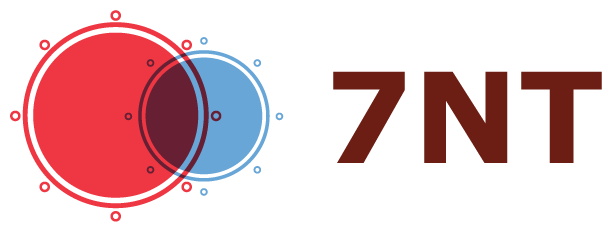Project Description
Monon Trail Bridge
Indianapolis, Indiana
The City of Indianapolis was awarded a $2 million grant in 2015 from the Federal Highway Administration’s Congestion Mitigation and Air Quality Improvement (CMAQ) Program to construct a bicycle/pedestrian bridge for the Monon Trail across 38th Street. The bridge eliminates a crossing where trail users navigated six lanes of traffic. The nearly $4.6 million project also added new sidewalks along 38th Street near the Indiana State Fairgrounds. The Monon Trail over 38th Street begins 650 feet north of 38th Street at the existing trail grade. The trail rises on a modular retaining wall to approximately 15 feet above grade, at which point a 5-span bridge structure supported on piles carries the trail over 38th Street.
7NT completed a total of fifteen (15) soil borings. Six (6) borings for the bridge structure, one at each pier and end bent location, four (4) borings at an 83-foot spacing alternating either side of the trail and five (5) borings at a 79-foot spacing alternating either side of the trail.
The bridge structure borings are to a depth of 70 feet below grade. Retaining wall borings vary in depth depending on the height of the retaining wall at approximately twice the height of the wall, or from 10 feet to 25 feet below grade. A total of 570 linear feet of drilling was completed to explore the subsurface conditions at the project site.
All of the soil borings were drilled using a truck-mounted drill rig per ASTM D-1452. Split Spoon and Shelby Tube samples were taken to explore the subsurface conditions per ASTM D-1586 and ASTM D-1587, respectively. Samples were taken at 2.5-foot intervals for the upper 20 feet and 5-foot intervals thereafter. Backfilling of the boreholes was performed in accordance with INDOT requirements and the pavement was patched to match existing pavement.
7NT completed a laboratory-testing program to determine the engineering properties of the site soils. Our laboratory testing program included the following tests:
- Moisture Content (ASTM D 2216, AASHTO T 265)
- Atterberg Limits (ASTM D 4318, AASHTO T 89, T 90)
- Sieve Analysis (ASTM D 422, AASHTO T 88)
- Unconfined Compressive Strength (ASTM D 2166)
- Soil Classifications (ASTM D 2487, ASTM D 2488)
- Standard Proctor Test (ASTM D 698)
- California Bearing Ratio (CBR) (ASTM D 1883)
- Loss of Ignition (AASHTO T 267)
- pH (AASHTO T 289)
- Total Phosphorus (AASHTO T 88)
- Total Potassium (AASHTO T 89)
An investigation report was submitted that includes an introduction, a description of the topography, drainage features, geology, field and laboratory testing, subsurface conditions, boring logs, laboratory test results, and engineering recommendations for the following items:
- INDOT Classification of site soils
- Recommendation of foundation type
- Foundation type and capacities including end bearing and skin friction resistances or bearing capacities as appropriate
- Estimated settlement
- Geotechnical Parameters for Retaining Wall Design
- Constructability of the proposed foundation
- Material compaction requirements
- Excavation support
- Groundwater control
- General earthwork activities
- Subgrade Evaluation
Field Experience Relevant to This Contract:
- On shore, off shore, river line soil drilling and sampling
- Rock drilling and coring
- Geo environmental investigations
- In-situ borehole testing
- Well installation
- Instrumentation installation
- Laboratory testing (geotechnical & environmental)
- Rock joint mapping
- Survey of borehole locations
Engineering Experience Relevant to This Contract:
- Geotechnical design, modeling, analysis, reporting
- Construction quality assurance (QA) testing
- Site exploration reports
- Engineering reports


